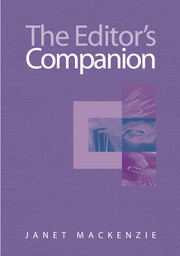Book contents
- Frontmatter
- Contents
- List of illustrations
- Preface
- 1 The editor in context
- 2 The publishing process
- 3 Management and liaison
- 4 Substance and structure
- 5 Language
- 6 Illustrations and tables
- 7 Completeness and consistency
- 8 Proofs
- 9 Editing methods
- 10 Working with documents and files
- 11 Freelance editing
- Appendix: Australian Standards for Editing Practice
- Notes
- Select bibliography
- Index
Appendix: Australian Standards for Editing Practice
Published online by Cambridge University Press: 05 June 2012
- Frontmatter
- Contents
- List of illustrations
- Preface
- 1 The editor in context
- 2 The publishing process
- 3 Management and liaison
- 4 Substance and structure
- 5 Language
- 6 Illustrations and tables
- 7 Completeness and consistency
- 8 Proofs
- 9 Editing methods
- 10 Working with documents and files
- 11 Freelance editing
- Appendix: Australian Standards for Editing Practice
- Notes
- Select bibliography
- Index
Summary
Preface
Editors are central to any publishing project; they endeavour to reconcile the needs of the author, the reader and the publishing client.
Editors look at the publication as a whole as well as at the detail. They ensure that the focus, structure, language, style and format of a publication suit its purpose and readership, and prepare the final copy to a standard of quality suitable for the publication.
Australian Standards for Editing Practice covers the knowledge and skills expected of experienced editors, although editors' workplace responsibilities and the requirements of particular projects will determine the relevance of each standard. Editors also recognise when they need to find out and apply specialised knowledge from other sources or professions.
These standards have been developed for editors to use:
as a basis for judging the comprehensiveness of their own knowledge and skills
when promoting themselves and the editing profession generally.
They will also help publishing clients understand the range of services editors provide, and guide educational institutions in developing editing courses.
These standards were devised by the Standards Working Group of the Council of Australian Societies of Editors (CASE), approved by the members of all Australian societies of editors, and ratified by CASE. They are to be reviewed at least every three years; please address comments to the closest member society.
The working group used the Editors' Association of Canada's Professional Editing Standards as a starting point and the Canberra Society of Editors' Commissioning Checklist as a reference.
- Type
- Chapter
- Information
- The Editor's Companion , pp. 189 - 200Publisher: Cambridge University PressPrint publication year: 2004



